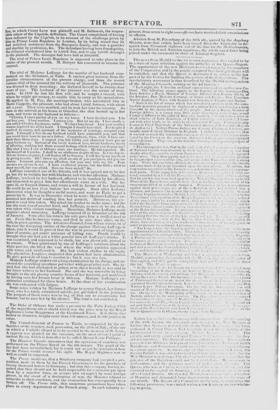The trial of Madame Laffarge for the murder of her
husband com- menced on the 3d instant, at Tulle. It excites great interest, from the peculiar circumstances of the present charge, and from the recent curious trial of the accused for the robbery of diamonds. The prisoner was dressed in deep mourning: she declared herself to be twenty-four years of age. The husband of the prisoner was the owner of iron- works. In 1830 he lost his first wife, and he sought a second, with whom he might get money, to enable him to carry on his speculations. He applied to M. Foy, the marriage-broker, who introduced Mtn to Marie Cappelle, the prisoner, who had about 1,600/.. fortune, with about 40/. a year. They were married, and he took her into the country. As soon as she arrived at his house at Glandier, she shut herself up in her room, and wrote to her husband as follows- " Charles, I crave pardon of you on my knees. I have deceived you. I do not love you. I love another. 1 esteem you. But let me die. I love another, also called Charles, handsome, noble. We have long loved. Last year another woman deprived me of his heart. I thought I should have died. For &spite I resolved to marry, and, ignorant of the mysteries of tnarritme, accepted your hand. I thought a kiss on my forehead would have contented you, and that you would have been to me as a &tiler. Comprehend, then, what I have suf- fered these three days. 1 respect you, but habits and character have pm an abyss between us. instead of the sweet words of love, trivial kindness, bursts of affection, nothing but those sensual feelings which actuate you disgust me ! Bin] that I love 1 saw at Orleans since our marriage. Ile has repented. lie hid himself at nerelie. I shall be an adulteress despite of me. Let Inc depart. Oct me horses, disguise, I will hasten off to Smyrna. I will live by my halms, or by giving lessons. Oh ! throw my cloak on one of you precipices, and give me arsenic. I cannot give you my affection, but you may take toy life. Your caresses are odious to me. I have swallowed poison, but too little ; tried to shoot myself, but was afraid. Save me from myself," &c.
Laffarge consulted one of his friends, and it was agreed not to let her go, but try to reclaim her with kindness, and win her affection. Maclaine Laffarge, retained by her husband, affected to be touched by his efforts, and consented to grant him her affectionate cares as a wife. She be- came ill, or feigned illness, and wrote a will in favour of her husband. He could do no less than imitate her example. Soon after Lallarge discovered what he thought a useful secret, and went to Paris to get a patent for it. It was iu December when he went : Madame Laffarge an- nounced her desire of sending him her portrait. Moreover, she pre - pared to send him cakes. She asked his toothier to make some; but the one site sent was of another kind, and Laffarge, as soon as he ate of it, was taken with violent vomitings. Meantime, Madame Laffarge made inquiries about mourning. Laffarge returned ill to Cloudier on the out of January. Soon after his return his wife gave him a truffle(' fowl to eat. From this he became worse, and died in nine days after, on the 14th, in great agonies. The Advocate-General, from whose statement of the case the foregoing outline of the charge against Madame Laffirge is taken, said it would be proved that she was in possession of large quan- tities of arsenic, got under pretence of killing rats. Proofs would be brought that she had put a white powder into all Laffarge's drinks. It was examined, and supposed to be chalk, but was afterwards proved to be arsenic. When questioned by one of Laffrage's relations about the white powder, she filled the vase where the white particles appeared with water, and swallowed it. She had violent cholics in the night. The physician. Lespines, suspected that poison had been administered. He gave peroxide of iron to combat it ; but it was too late. Madame Laffarge underwent a long examination by the Judge, and an- swered the searching questions put to her with great adroi•ness. Site de- nied that she had attempted to poison or to shoot herself, as was said in her letter written to her husband. She said she was miserable in being brought to the old gloomy country-house of her husband, and maddened by having seen her timelier lover at Orleans. Madame Laffarge's ex- amination continued for three hours. At the close of her examination She was exhausted with fatigue. Some notes written by Madame Laffarge to young G nyet, her former lover, who huts lately committed suicide, are published in the journals. The purport of these notes was to beg of hint not to compromise her honour, but to save her by his silence. The trial is not concluded.


























 Previous page
Previous page